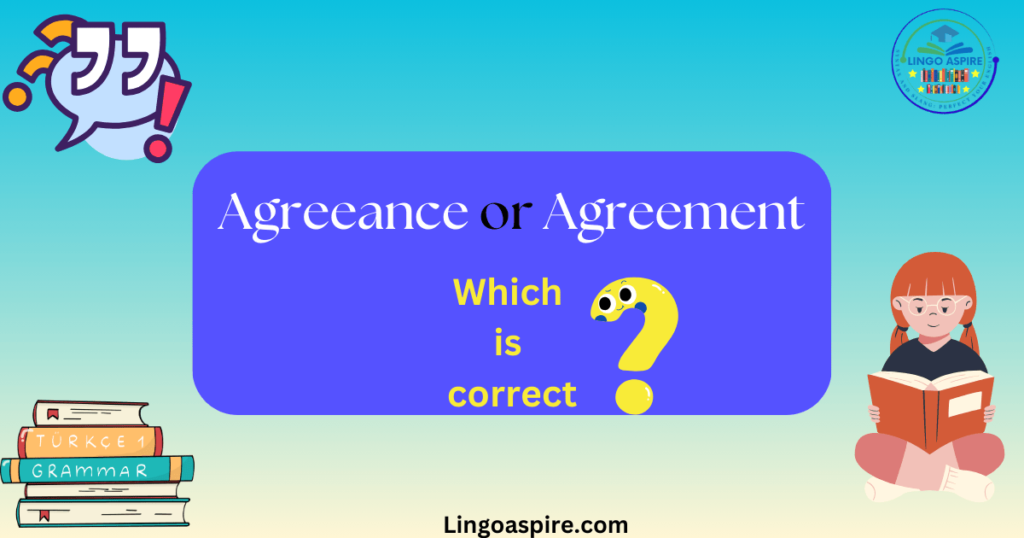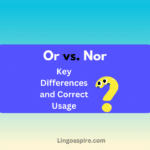Language can be tricky, especially when similar words like agreeance and agreement seem to mean the same thing. However, there are some important distinctions between the two, especially in terms of formal and informal usage. In this article, we’ll explore the differences, origins, and common confusions between agreeance and agreement. By the end, you’ll know which word to use in different contexts and how to avoid common mistakes in both formal writing and informal speech.
What’s the Difference Between Agreeance and Agreement?
When it comes to agreeance vs agreement, it’s easy to get confused, as both words seem to have similar meanings. Agreement is the correct term most of the time, while agreeance is considered an older, less common version. Simply put, agreement is a formal and standard word used to describe a mutual understanding or decision between people. It’s commonly used in business documents, contracts, and other formal settings. On the other hand, agreeance is more informal and typically used in casual speech. Despite its meaning being similar to agreement, it is rarely found in formal writing.
The confusion between the two often arises because they are historically linked. In some places or in certain circles, people still use agreeance in conversation, though it is becoming less common. While both words suggest a mutual understanding, one (agreement) is much more widely accepted in professional and official contexts. If you’re unsure which to use, agreement is always a safer bet.
Breaking Down Each Word: Agreeance vs Agreement
Agreeance: What Does It Mean?
The word agreeance has an informal meaning that relates to being in mutual agreement with someone. It was once used more frequently in the past but is now considered a nonstandard term. It’s often heard in casual speech, especially in certain regional dialects. However, it is not typically used in formal writing or professional communication.
For example, you might hear someone say, “We were in agreeance on the decision,” but this would sound awkward in any professional or legal document. Though people still use it in everyday conversations, agreeance is gradually falling out of favor. It’s important to remember that it is not grammatically correct in most formal contexts.
Agreement: What Is It?
Agreement, on the other hand, is a well-established word in both informal and formal writing. It refers to the state of being in mutual understanding or harmony with others, whether it’s about a decision, contract, or idea. Agreement is widely accepted in both casual and serious settings, including business agreements, legal contracts, and everyday conversations.
A signed agreement between two parties, for instance, ensures that both individuals or groups are clear about their terms. Whether it’s a verbal agreement or a written agreement, it signifies a shared understanding between all involved. This is why agreement is considered the correct term to use in most cases.
Agreeance vs Agreement: Which One Should You Use?
When to Use “Agreement”
In most scenarios, you should always opt for agreement. It is the standard word used in formal writing, such as business contracts, negotiations, and legal documents. When two or more parties come to a mutual decision, it is referred to as an agreement. Whether you are signing a contract or simply having a conversation, agreement works in all situations.
Agreement examples in business contexts might include:
- A written agreement outlining the terms of a partnership.
- A mutual agreement reached during a meeting between two companies.
- A signed agreement that lays out the clauses in a business transaction.
In formal contexts, using agreement helps ensure clear communication. It conveys professionalism and prevents any potential misunderstandings. Agreement is also preferred when discussing contracts or formal decision-making.
When You Might Hear “Agreeance”
While agreeance isn’t standard in formal writing, it still shows up in casual conversations. People may say things like, “They were in agreeance that it was the best choice,” but this is often heard in informal settings and should be avoided in formal documents. It’s a less common term and tends to appear mostly in informal speech or in particular regional dialects.
In general, you should avoid using agreeance in professional or legal contexts because it lacks the clarity and standardization of agreement. That said, there’s no harm in using it in a casual conversation or to emphasize shared understanding in informal discussions. But if you want your language to sound polished and professional, stick to agreement.
Origins and History: Where Did These Words Come From?
The Origin of “Agreement”
The word agreement has a long history. It can be traced back to the Latin word “agreare,” which means “to please or to accept.” Over time, the term evolved in various languages before becoming the English word agreement we use today. It’s been in widespread use for centuries and is now the standard term in both formal writing and informal speech.
In legal contexts, agreement has always carried a sense of legality and binding understanding. Whether it’s the agreement reached between two nations or the contract signed between an employer and employee, agreement remains the most precise and effective term. Its consistent usage in formal documents, such as contracts and negotiations, makes it a key element in clear communication.
The Origin of “Agreeance”
On the other hand, agreeance is a more recent and less common term. It likely emerged as a variation of agreement and was used in some regional dialects, particularly in the 17th century. Over time, agreeance began to fade from standard English, especially as language trends shifted toward clarity and precision. It’s considered an outdated or archaic form and is not typically found in modern dictionaries.
Today, the word agreeance is mainly seen in informal speech or used occasionally to add color to casual conversations. While it’s not necessarily “wrong,” it is nonstandard and should be avoided in formal communication.
Breaking Down the Causes of Confusion Between Agreeance and Agreement
Many people are still unsure whether to use agreeance or agreement, especially in informal speech. This confusion usually comes from the similarity in their meanings and the historical overlap between the two terms.
The problem often arises in spoken language, where agreeance is sometimes used because it sounds more natural or comfortable for some speakers. However, this can lead to confusion when writing formal documents, such as contracts, where agreement is the appropriate choice. Understanding when to use each term is important to ensure you communicate clearly and avoid confusion.
Additionally, some people may confuse agreeance with agreement because they both express the idea of mutual understanding. However, agreement has more widespread use and is considered grammatically correct in all contexts, while agreeance should be used sparingly and only in informal settings.
Examples in Context: Agreeance vs Agreement
To better understand the difference between agreeance and agreement, let’s look at some example sentences:
| Context | Agreeance Example | Agreement Example |
|---|---|---|
| Business | They were in agreeance that the deal was fair. | They reached an agreement on the terms of the deal. |
| Formal Writing | – | The two parties signed the agreement this morning. |
| Casual Speech | We were in agreeance on the subject. | – |
Notice that while agreeance might be heard in casual speech, it doesn’t work well in more formal or professional settings.
Conclusion: Which One is Correct?
When you’re writing or speaking professionally, agreement is the term you should always use. It’s the standard term for mutual understanding and formal decisions, especially in business documents, legal agreements, and contracts.
Agreeance, though it means the same thing, is considered a nonstandard term and is best reserved for informal conversations. While it’s still used in some regions or circles, it’s best to stick with agreement when you need to ensure your message is clear and professional.
Ultimately, the choice between agreeance and agreement is straightforward: choose agreement for formal situations, and be aware that agreeance is more common in casual speech but not recommended for formal or legal use.
Spurces
- Grammarist: This article provides a detailed comparison between “agreeance” and “agreement,” explaining their meanings, usage, and the reasons behind the confusion between the two terms.
- Grammar Palette: This resource offers insights into the less common usage of “agreeance,” highlighting its informal nature and the subtle differences in meaning compared to “agreement.”
- Grammar Echo: This article explores the reasons behind the confusion between “agreeance” and “agreement,” emphasizing the importance of using the correct term in various contexts.







